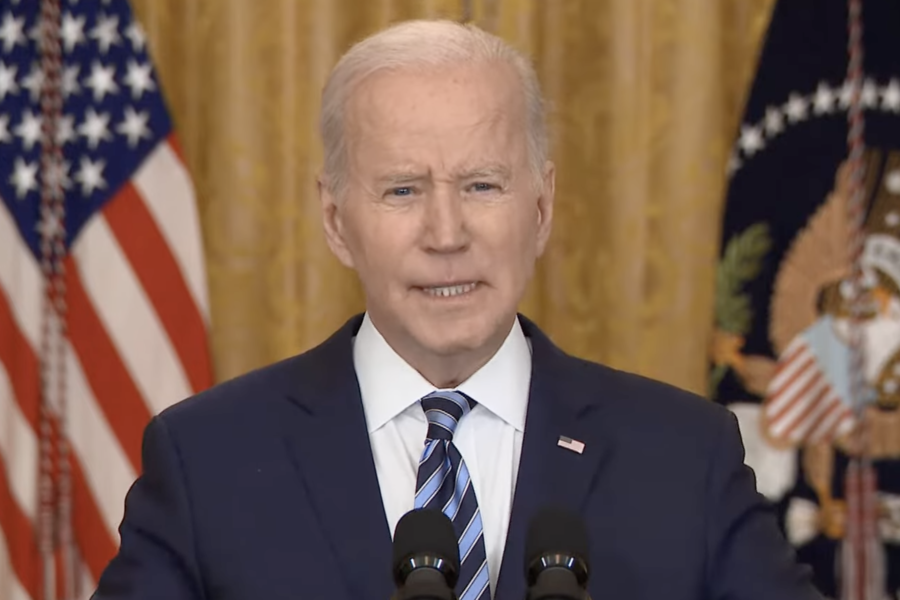President Joe Biden announced new sanctions against Russia and ordered the deployment of 7,000 additional service members to Germany to reassure NATO allies after Russia invaded Ukraine, but the President withheld the most serious punishment, citing disagreement among European partners.
“This is a dangerous moment for all of Europe, for the freedom around the world,” Biden said from the East room of the White House after a day that included a meeting with his National Security Council and G-7 world leaders.
“It’s a large conflict already,” Biden said. “The way we’re going to assure it’s not going to spiral to a larger conflict is by providing all the forces needed in the Eastern European nations that are members of NATO.”
In response to the President’s directive, Defense Secretary Lloyd J. Austin III has ordered an armored brigade combat team to Germany, a senior defense official said in a statement.
“They will deploy to Germany to reassure NATO allies, deter Russian aggression, and be prepared to support a range of requirements in the region. We expect them to depart in the coming days,” the statement read.
In recent days, Biden has ordered the repositioning of six F-35s and a total of 24 F-16s and F-15s to the NATO eastern flank to take part in joint training and enhanced air policing missions. He also repositioned an infantry battalion, attack aviation battalion, and attack aviation task force totaling 32 Apache helicopters, multiple Stryker units, and 4,700 troops from the 82nd Airborne Division. NATO is set to meet Feb. 25 to discuss further measures, including the possible deployment of 8,500 U.S. troops currently in the U.S. on high alert as part of a NATO Reaction Force. Some of the 7,000 troops set to deploy will come from those already standing on alert, with the bulk of those forces coming from Fort Carson, Colo., and Fort Bragg, N.C., the Pentagon confirmed.
Former U.S. Ambassador to Ukraine John E. Herbst told Air Force Magazine additional forces were needed on the eastern flank as a show of force to Russian President Vladimir Putin.
“Now’s the time to truly increase NATO forces in the East,” he said. “And let it be known to Moscow that this is not on a temporary basis, so that they see their geopolitical position deteriorating, and we make sure we continue the weapons flowing to Ukraine.”
Biden did not say how long the additional forces would remain in Europe, though eastern flank allies have long called for increasing the permanent U.S. troop and capabilities presence.
Punishing Sanctions
Biden also announced punishing new sanctions designed to cripple the Russian economy, military, technology, and aerospace industries.
“Putin’s aggression against Ukraine will end up costing Russia dearly, economically and strategically,” Biden said before outlining a series of coordinated sanctions to target more than $1 trillion of Russian assets, impose new export controls, sanctions on oligarchs close to Putin, and restrictions on Russia’s ability to raise money from investors.
Criticized for not imposing the sanctions before Russia began its attack on Ukraine early Feb. 24, Biden said it could take a month or longer before sanctions begin to impact the Russian economy.
“No one expected the sanctions to prevent anything from happening,” Biden said. “This is going to take time … He’s gonna test the resolve of the West to see if we stay together. And we will—we will—and we’ll impose significant costs on him.”
Biden said he spoke to Ukrainian President Volodymyr Zelensky late Feb. 23, promising humanitarian assistance, and expressed confidence in the Ukrainian people to resist a much more powerful Russian military.
The U.S. has provided more than $650 million in defense assistance to Ukraine in the past year, but the President did not comment on continued defense support to the Ukrainian military. A day earlier the Department of Defense said it was exploring alternative means of transferring defense assistance once airspace is closed.
Biden also said Putin had left diplomatic options on the table before launching an avoidable war.
“Putin is the aggressor. Putin chose this war, and now he and his country will bear the consequences,” Biden said. “It was always about naked aggression, about Putin’s desire for Empire, by any means necessary, by bullying Russia’s neighbors through coercion and corruption, by changing borders by force. And ultimately, by choosing a war without a cause.”
The U.S. President did not escape criticism from the White House Press Corps, who demanded why he would not sanction Putin himself or block Russia from the international banking system known as SWIFT.
Biden did not respond to questions about sanctioning Putin, but he indicated he did not have consensus for the action to remove Russia from SWIFT.
“Right now, that’s not the position that the rest of Europe wishes to take,” Biden said. “. .. The sanctions we’ve imposed exceed SWIFT; the sanctions we impose exceed anything that’s ever been done.”
Biden said the sanctions regiment outlined reached a consensus of “two-thirds of the world joining us” totaling more than half the world economy.
Biden declined to comment when questioned as to whether he was pressuring China to isolate Russia.
Herbst said that not including SWIFT was “a mistake, but predictable.”
Still, Herbst said Ukraine has a plan for continuity of government during the war and the Ukrainian people will resist a Russian occupation.
“Any government they install will be installed by Russian bayonets,” Herbst said. “Napoleon said, famously, ‘You can do anything with bayonets except sit on them.’”
